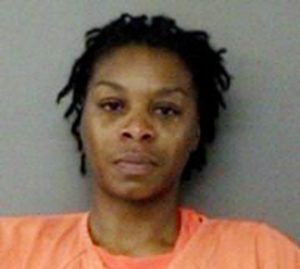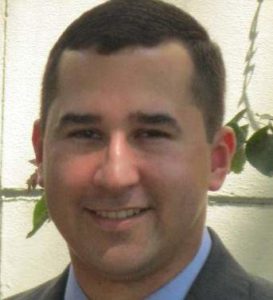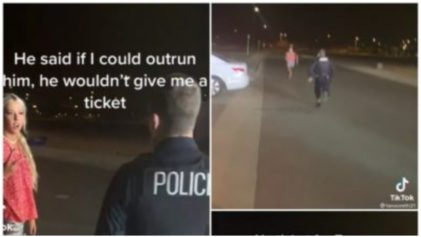
Do you remember Sandra Bland? The young Black woman in the prime of her life was stopped by a Texas trooper on July 10, accused of failing to use her turn signal. She was arrested, and a few days later was found dead in a Waller County jail cell. Police say she hanged herself—which they always said when Black people were found dead in a jail cell in the South—but Black folks always knew there was far more to the story. Well, now, after failing to indict anyone in her jailhouse death, a grand jury has indicted Brian Encinia, the state trooper who arrested her, for perjury.
As CNN reported, the grand jury did not believe his statement that he took her from her car in order to perform a safer traffic investigation. Encinia, who reportedly arrested Bland, 28, “for Assault on a Public Servant,” claimed she was “combative and uncooperative.”
Some voices in the media, taken to the white supremacist stereotype of the angry Black woman, held Bland responsible for her own death for supposedly failing to comply with the officer, sassing the trooper and not obeying his orders.
Perjury, a Class A misdemeanor, could land Encinia in jail for up to a year, with up to a $4,000 fine. Moreover, the Texas Department of Public Safety announced it would begin termination proceedings against the officer.
Word out of Texas comes as DeKalb County prosecutors seek to indict officer Robert Olsen, who fatally shot Anthony Hill, 27, a U.S. Air Force Veteran who served in Afghanistan, this past March.
Hill, who was unarmed, was wandering around naked outside his apartment complex due to an adverse reaction to medication he took for his bipolar disorder, according to the Atlanta Journal-Constitution. Although the officer had a Taser, he fired on Hill twice, killing him. The district attorney has not announced whether he will indict the DeKalb County officer who killed Kevin Davis. Davis, 44, was shot by police in his apartment after he called 911 to report the stabbing of his girlfriend by another man.
The AJC reported that in Georgia, while grand juries typically rubber stamp whatever the prosecutor wants to do, a special exemption for cops creates roadblocks in going after them. Georgia is the only state that allows police facing charges to sit in the grand jury room for the entirety of the proceedings. Also, unlike regular citizens, the officer is permitted to make a statement without being challenged by the prosecutor.
Further, according to the AJC, nearly half of the 184 people shot and killed by police in Georgia were shot in the back, contradicting claims of lawful shootings and self-defense. None of the officers have faced prosecution. Meanwhile, in Broward County, Florida, no officers have been indicted in the 168 fatal police-related shooting since 1980, as WPLG Local10.com reported, until weeks ago. In December, Broward County Sheriff’s deputy Peter Peraza was indicted on first-degree manslaughter charges in the death of Jermaine McBean. McBean, 33, a computer systems engineer, was killed in July 2013 after Peraza responded to 911 calls reporting a man walking down the street with a rifle. McBean was carrying an unloaded toy pellet gun from a pawn shop.
Looking at the national landscape, while they say you can indict a ham sandwich, often there is no will to prosecute the police. District attorneys, who are pro-law enforcement and depend on police officers for testimony and evidence in their cases, often are loath to pursue bad cops and bite the hand that feeds them, so to speak. Grand juries are needed for indictments for murder and other serious felonies in 23 states, according to the Guardian, while 25 other states make it optional and allow prosecutors to file charges on their own.
The grand jury process can become a tool for corrupt and uncaring prosecutors, a refuge for scoundrels who have no intention to indict police, such as in the death of Michael Brown in Ferguson, Eric Garner in New York, and Tamir Rice in Cleveland. The grand jury process, conducted in secret, can provide political cover for a reluctant district attorney. And so, prosecutors will go out of their way to issue “expert” reports and make statements to defame the person who was murdered and justify the officer’s actions, acting as virtual defense counsel for the offending officer.
This amounts to a grave and glaring conflict of interest on the part of prosecutors, which is why California Gov. Jerry Brown signed a law making his state the first to ban grand juries in deciding whether police officers should face criminal charges for killing people while on duty. As William Campbell, a former federal judge in Chicago said, “The grand jury is the total captive of the prosecutor who, if he is candid, will concede that he can indict anybody, at any time, for almost anything, before any grand jury.”
But there is more. Prosecutors are politically motivated elected officials, 95 percent of whom are white, and overwhelmingly male. They receive campaign contributions from police unions and often care little about Black lives. Black women prosecutors such as Baltimore State’s Attorney Marilyn Mosby, California Attorney General Kamala Harris and U.S. Attorney General Loretta Lynch are the exceptions in a justice system where white men with no racial justice lens determine the fate of Black people.
As the Guardian recently reported, in 2015 there were 217 cases where a police officer who killed someone was cleared of wrongdoing, and in which a prosecutor—who works with police on a regular basis—led the process. A most recent example of this was the failure by a grand jury to charge officers in the Tamir Rice case. That amounts to 85 percent of all police-related killings that were ruled justified that year. Meanwhile, of the 18 fatal police incidents leading to criminal charges, four were led by state-level prosecutors, and 13 were investigated by an external police department. Further, in one-third of cases that were declared justified, the criminal investigation was conducted by the suspect officer’s own police force, and the evidence handled by his fellow officers. And of the police killings ruled justified last year, the criminal investigation was independent of the police department in a mere 12.5 percent of cases.
The crime of murder has no statute of limitations, that is, a law barring prosecutors from charging someone for a crime committed more than a certain number of years ago.
This is why it is taking so long to find even a glimpse of justice for Sandra Bland, Anthony Hill and so many others.



